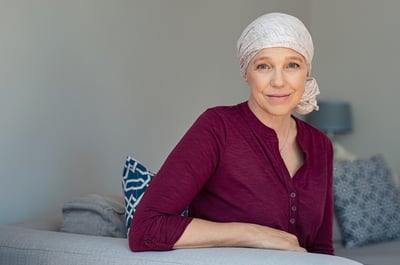FORCE's eXamining the Relevance of Articles for You (XRAY) program looks behind the headlines of cancer news to help you understand what the research means for you.
XRAY is a reliable source of hereditary cancer research-related news and information.
Learn more about the XRAY program
Keyword: hormone therapy, In portal: Breast Cancer
Update : New drug combination for the second treatment of some HR-positive advanced breast cancers
Most relevant for: People with hormone receptor (HR)-positive or HER2-negative breast cancer that has spread outside the breast tissue.
The FDA approved Truqap plus Faslodex for the treatment of metastatic hormone receptor-positive (HR-positive), HER2-negative breast cancer that returned or worsened after treatment with hormone therapy. The approval is for treating cancers in people whose tumors had a mutation in one of three genes. For people with one of these mutations, Truqap improved the time until their cancer came back or got worse. (Posted 2/9/24)
Este artículo está disponible en español.
Read More
Relevance: Medium-High


Strength of Science: Medium-High


Research Timeline: Post Approval


Study : Pausing hormone therapy to pursue pregnancy does not increase the short-term risk of early-stage cancer recurrence
Relevance: Medium-High


Strength of Science: Medium-High


Research Timeline: Post Approval


Most relevant for: Women with breast cancer who are considering pregnancy
Women who paused hormone therapy treatment of early-stage hormone receptor-positive (HR-positive) breast cancer to attempt to get pregnant had no increase in short-term recurrence. (Posted 11/3/23)
Este artículo está disponible en español.
Read More
Relevance: High


Strength of Science: Medium-High


Research Timeline: Post Approval


Study : Breast cancer outcomes improved with CDK4/6 inhibitor treatment
Relevance: High


Strength of Science: Medium-High


Research Timeline: Post Approval


Most relevant for: People with HR-positive HER2-negative advanced breast cancer
A study showed that people with metastatic breast cancer who took an oral drug known as a CDK4/6 inhibitor combined with hormone therapy did better than people who took hormone therapy alone. The drug combination improved the length of time before cancer worsened or returned. After six years of treatment, people who took this drug combination lived longer compared to those who took hormone therapy alone. (Posted 4/5/23)
Este artículo está disponible en español.
Read More
Relevance: High


Strength of Science: High


Study : Treatment to reduce bone fractures also improves breast cancer survival in postmenopausal people
Relevance: High


Strength of Science: High


Most relevant for: People with early-stage breast cancer who are post-menopausal
A large study looked at the effects of adding the bone-protective drug denosumab (Prolia), to standard hormone therapy for the treatment of early-stage, postmenopausal, HR-positive breast cancer. The researchers found that adding denosumab to aromatase inhibitor hormonal therapy improved bone health, disease-free survival and overall survival. (Posted 2/27/23)
Este artículo está disponible en español.
Read More
Relevance: Medium-High


Strength of Science: High


Research Timeline: Post Approval


Guideline : ASCO guidelines recommend olaparib for people with early-stage, high-risk breast cancer and an inherited BRCA mutation
Relevance: Medium-High


Strength of Science: High


Research Timeline: Post Approval


Most relevant for: People with early-stage HER2-negative breast cancer and an inherited BRCA mutation
The American Society of Clinical Oncology (ASCO) has updated their breast cancer treatment guidelines to include treatment with the PARP inhibitor olaparib (Lynparza) for one year after completing chemotherapy, surgery and radiation (if used) to improve outcomes of people with an inherited mutation in BRCA1 or BRCA2 with early-stage, HER2-negative breast cancer who have a high risk for recurrence. (posted 8/6/21) Update: Based on results from the OlympiA Study, the FDA approved olaparib as adjuvant treatment for people with an inherited BRCA mutation who have been diagnosed with early-stage HER2-negative breast cancer and are at high risk for recurrence. (03/11/2022)
Este artículo está disponible en español.
Read More
Relevance: Medium-High


Strength of Science: High


Research Timeline: Post Approval


Study : Can tumor tests identify more breast cancer patients who can safely skip chemotherapy?
Relevance: Medium-High


Strength of Science: High


Research Timeline: Post Approval


Most relevant for: Women with breast cancer
Two studies presented at the December 2020 San Antonio Breast Cancer Symposium looked at how tumor testing can identify patients who may benefit the most and the least from chemotherapy. (3/4/21)
Este artículo está disponible en español.
Read More
Relevance: Medium-High


Strength of Science: Medium-High


Research Timeline: Post Approval


Study : How breast cancer patients experience hormone therapy
Relevance: Medium-High


Strength of Science: Medium-High


Research Timeline: Post Approval


Most relevant for: Breast cancer patients taking or considering taking hormone therapy
Side effects from hormone therapy are a common reason that many men and women with hormone receptor-positive breast cancer stop treatment early. Some people never start hormone therapy. This study asked patients about their experiences with hormone (or endocrine) therapy. The results suggest that there may be ways to improve the number of patients who stick with therapy. Patients need better ways to manage hormone therapy-related side effects. (1/19/21)
Este artículo está disponible en español.
Read More
Relevance: Medium-High


Strength of Science: High


Research Timeline: Post Approval


Study : Hormone therapy and breast cancer risk after ovary removal in women with a BRCA1 mutation
Relevance: Medium-High


Strength of Science: High


Research Timeline: Post Approval


Most relevant for: Women with BRCA1 mutations who have had risk-reducing ovary removal and have never been diagnosed with breast cancer
Does hormone therapy (HT) alter the risk of breast cancer for woman carrying a BRCA1 mutation who have never been diagnosed with cancer? In this study, researchers showed that among women with BRCA1 mutations, HT use did not increase breast cancer rates for 10 years after ovary removal. More women taking combined estrogen plus progesterone developed breast cancer compared to those taking estrogen only, though this difference was not statistically significant. (9/7/18)

Study : Does eating soy affect the risk of death in breast cancer survivors?
Most relevant for:
Is eating soy safe for people who have had breast cancer? This topic has been controversial among health care providers, patients, and survivors for many years because research has yielded mixed results. Some studies suggest people who have been diagnosed with breast cancer should eat more soy products, while other studies recommend they eat less or avoid it altogether. Which should it be? Adding to this research is a new study that asked breast cancer survivors about their soy consumption before and after diagnosis. (4/27/17)
Read More
Study : Cancer treatment costs can vary widely
Most relevant for: People diagnosed with breast cancer
Healthcare providers cannot give their breast cancer patients information on chemotherapy treatment costs because not enough is known about the exact costs. New research finds that costs vary not only between different cancer treatments, but also between similar treatments, such as all treatments that target HER2+ breast cancer. (11/22/16)
Read More